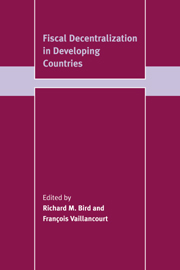Book contents
- Frontmatter
- Contents
- List of tables
- List of contributors
- Preface
- 1 Fiscal decentralization in developing countries: an overview
- 2 China: evaluating the impact of intergovernmental fiscal reform
- 3 India: intergovernmental fiscal relations in a planned economy
- 4 Indonesia and Pakistan: fiscal decentralization – an elusive goal?
- 5 Morocco and Tunisia: financing local governments – the impact on infrastructure finance
- 6 Colombia: the central role of the central government in fiscal decentralization
- 7 Argentina: fiscal federalism and decentralization
- 8 South Africa: an intergovernmental fiscal system in transition
- 9 Bosnia-Herzegovina: fiscal federalism – the Dayton challenge
- Index
6 - Colombia: the central role of the central government in fiscal decentralization
Published online by Cambridge University Press: 09 October 2009
- Frontmatter
- Contents
- List of tables
- List of contributors
- Preface
- 1 Fiscal decentralization in developing countries: an overview
- 2 China: evaluating the impact of intergovernmental fiscal reform
- 3 India: intergovernmental fiscal relations in a planned economy
- 4 Indonesia and Pakistan: fiscal decentralization – an elusive goal?
- 5 Morocco and Tunisia: financing local governments – the impact on infrastructure finance
- 6 Colombia: the central role of the central government in fiscal decentralization
- 7 Argentina: fiscal federalism and decentralization
- 8 South Africa: an intergovernmental fiscal system in transition
- 9 Bosnia-Herzegovina: fiscal federalism – the Dayton challenge
- Index
Summary
As in a number of other countries in Latin America, prolonged and sometimes violent conflict between “centralists” and “federalists” occurred in Colombia during the latter part of the nineteenth century. As in most of the continent, the centralists won. Despite marked regional differences and persistent strong regional identities fostered by the difficulties of travel in a country broken up by mountainous terrain, Colombia's governing structure remained highly centralized until very recently. The central government (and its many “decentralized” agencies) not only controlled almost all public revenues and expenditures but also, outside of the largest cities, virtually supplanted the traditional territorially based governments, the departments and municipalities, in providing even the most local of services. Little scope and little reward existed for local initiative, and the most successful local politicians were those who could best exploit the labyrinthine central government system for the benefit of their constituents.
By the late 1970s, however, this system had begun to break down, for two reasons. First, and most importantly, central government finances were increasingly strained by the task of financing the expansion of local public services to an increasingly urbanized population. This strain was perhaps felt earlier and more strongly in Colombia than in other Latin American countries owing to the country's long tradition of maintaining a relatively stable and conservative central government fiscal policy. Second, the highly centralized system was also contributing to political unrest, as such critical services as water, education, and health were failing to reach large segments of Colombian society.
- Type
- Chapter
- Information
- Fiscal Decentralization in Developing Countries , pp. 172 - 205Publisher: Cambridge University PressPrint publication year: 1999
- 4
- Cited by



